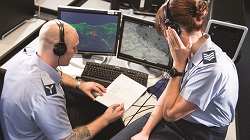-
QUALIFICATIONS
- For Linguists Worldwide
- For UK Public Services
- Preparation
- Policies & Regulation
-
MEMBERSHIP
- Join CIOL
- Professional Membership
- Affiliate Membership
- Chartered Linguist
- Already a member?
- Professional conduct
- Business & Corporate Partners
-
LANGUAGE ASSESSMENTS
- English
- All Other Languages
-
CPD & EVENTS
- Webinars & Events
- CIOL Conferences
- Networks
- CIOL Mentoring
-
NEWS & VOICES
- News & Voices
- CIOL eNews
- CIOL Awards
- The Linguist Magazine
- Jobs & Ads
-
RESOURCES
- For Translators & Interpreters
- For Universities & Students
- Standards & Norms
- CIOL & AI
- All Party Parliamentary Group
- In the UK
- UK Public Services
- Find-a-Linguist
Sky’s the limit
An Intelligence Analyst* in the RAF Specialist Recruitment Team explains why language skills are so vital to the work
 An Intelligence Analyst (Linguist) or Int An (L) plays a vital role in protecting the security of domestic, national and international interests by interpreting, analysing and disseminating intelligence through the interception of foreign voice transmissions using state-of-the-art receiving and recording systems. From this, valuable intelligence about actual or potential enemies, and their strengths, weaknesses, movements and locations, can be discovered. There is also the opportunity to act as an interpreter for troops on the ground.
An Intelligence Analyst (Linguist) or Int An (L) plays a vital role in protecting the security of domestic, national and international interests by interpreting, analysing and disseminating intelligence through the interception of foreign voice transmissions using state-of-the-art receiving and recording systems. From this, valuable intelligence about actual or potential enemies, and their strengths, weaknesses, movements and locations, can be discovered. There is also the opportunity to act as an interpreter for troops on the ground.
Whatever their role, the contribution from linguists is vital to operational success as they support operations across the globe and assist senior commanders in making key decisions. In some cases, they may be the first or only people to hear vital pieces of information, which can affect the outcome of a military objective and save lives. On operations, linguists can be expected to support ground missions by intercepting enemy communications in the area and monitoring potential threats. This is especially significant in operational theatres where soldiers are deployed on the ground in hazardous territory.
In-depth training
The Royal Air Force (RAF) relies significantly on the high-calibre skills of its Int An (L) cadre. Personnel are currently taught languages of operational importance in an intensive 18-month course designed for people who have never learnt the language before. Students are taught all four aspects of a language (reading, writing, speaking and listening) and are assessed regularly on their progress.
The languages taught at the Defence College for Languages and Culture change depending on operational requirements (currently Arabic, Russian and Farsi). This is followed by an applied course designed to bridge the gap between formal language learning and the ability to interpret, decipher and analyse real-world military intelligence audio cuts.
Here, linguists become fully equipped to affect operations and able to influence commanders’ decisions effectively based on the information they gather and translate. CIOL now offers membership to RAF personnel who train to become linguists, commensurate with training and the application of the language.
Challenges and developments
There are several challenges for the RAF in recruiting and training Int An (L) personnel. The demand for military linguists has grown exponentially in recent years following Government direction to bolster military intelligence personnel numbers. This has tested the RAF’s ability to recruit more personnel at a faster pace. Given the classified nature of the work, it is difficult to advertise the Int An (L) trade and make it accessible to the public.
In order to improve recruitment, and the information available to the public, a specialist recruitment team was set up to combat these challenges. As part of its new initiative programme, a video was created for social media showing the training and work of an Int An (L). It has received praise for its fresh insight into RAF roles.
Steps have also been taken to reduce the time it takes for candidates to progress through the recruitment process. Candidates are required to pass a Modern Languages Aptitude Test in order to prove their ability to learn a language in a short time period. They can now take this test in their local Armed Forces Careers Office before deciding which role may be right for them, giving them a clear indication of their suitability to be a linguist. This measure has made it easier for the RAF to find the best people for each role. It also allows a higher volume of people to attempt the test without any pressure to apply beforehand.
For those interested in joining as a linguist after their higher education studies, the RAF has introduced a bursary scheme for students doing a languages BA. We pay a contribution towards tuition fees and candidates join the RAF as linguists after completing their degrees. This initiative has been put in place to attract candidates with a language interest and capability, allowing the RAF to hone their skills and passion for languages.
The future
The demand for RAF linguists is set to grow over the next decade, along with the expectations we place on our talented personnel. The Specialist Recruitment Team will continue to create new initiatives to advertise the RAF brand and intelligence roles, including activity schemes for people to have first-hand experience of the job before they apply.
The training of RAF linguists will continue to evolve and adapt depending on operational requirements, changing the languages taught and the types of applied training we offer. This opens the door for the continued professional development of our dedicated and multi-talented linguist personnel.
Visit ciol.org.uk/rafpartnership for more information.
* The author’s name has been withheld for security reasons.
Filter by category
More
The Chartered Institute of Linguists (CIOL), Incorporated by Royal Charter, Registered in England and Wales Number RC 000808 and the IoL Educational Trust (IoLET), trading as CIOL Qualifications, Company limited by Guarantee, Registered in England and Wales Number 04297497 and Registered Charity Number 1090263. CIOL is a not-for-profit organisation.








